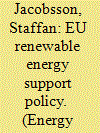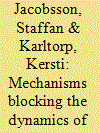|
|
|
Sort Order |
|
|
|
Items / Page
|
|
|
|
|
|
|
| Srl | Item |
| 1 |
ID:
094220


|
|
|
|
|
| Publication |
2010.
|
| Summary/Abstract |
In the European policy debate, tradable green certificates (TGC) have been suggested to be a superior regulatory framework for promoting the diffusion of renewable electricity technologies. The purpose of this paper is to assess the performance of the Swedish TGC system, contributing to the European debate on the suitability of different types of frameworks. The expectations of the TGC system were that it would: (a) be effective in terms of increasing the supply of "green" electricity; (b) do this in a cost effective manner (from both a social and a consumer perspective); (c) generate an equitable distribution of costs and benefits and (d) drive technical change. So far, it has performed adequately in terms of effectiveness and social cost effectiveness. However, consumer costs have been substantially higher than expected, very large rents are generated and, at best, it contributes marginally to technical change. Thus, a TGC framework should be selected if the overriding concern is to minimize short term social costs of reaching a certain goal with a high degree of predictability. However, it cannot be expected to also drive technical change, keep consumer costs down and be equitable. Such trade-offs need to be revealed and not obscured by analysts.
|
|
|
|
|
|
|
|
|
|
|
|
|
|
|
|
| 2 |
ID:
088212


|
|
|
|
|
| Publication |
2009.
|
| Summary/Abstract |
The recent EU Commission proposal for promoting the supply of power from renewable energy sources was originally based on a pan-European, harmonised tradable green certificate (TGC) scheme. We suggest, on the basis of a multi-disciplinary analysis, that a pan-EU TGC system is not the way forward for Europe. It is vital that the Commission (and the majority of Member States) avoids implementation of such policy designs put forward by a coalition of vested interests. They should instead look at, and act upon, the available evidence from those countries that have experimented with TGCs (e.g. Flanders, UK and Sweden) and design policies that stand a better chance of meeting the criteria of effectiveness, efficiency and equity. In particular, the policies must enable EU to meet the immense innovation/industrialisation challenge by inducing the development of a capital goods industry that can, eventually, diffuse a broad range of technologies that use renewable energy sources. Only then we can acquire an ability to implement an industrial revolution in the energy system in a way that broadly meets the criteria of effectiveness and dynamic efficiency.
|
|
|
|
|
|
|
|
|
|
|
|
|
|
|
|
| 3 |
ID:
112319


|
|
|
|
|
| Publication |
2012.
|
| Summary/Abstract |
The electricity sector has to undergo a large-scale transformation process to reduce the threat of climate change. Wind power has a strategic role to play in this process. This paper makes a preliminary assessment of the types and numbers of engineers required to sustain a large-scale expansion of offshore wind energy in the EU and draws lessons for universities. A variety of competences are required, including (a) deep competences in many fields (electrical and mechanical engineering, but also engineering physics and civil engineering); (b) integrative competences within engineering (e.g., mechanical and electrical engineering) and between engineering and non-engineering fields (e.g., meteorology and logistics). A large number of engineers are required. A rough estimate indicates a need for more than 10 000 new engineers until 2020. The nature and volume of the competences required raise serious questions for the scale and organization of training programmes at universities.
|
|
|
|
|
|
|
|
|
|
|
|
|
|
|
|
| 4 |
ID:
126617


|
|
|
|
|
| Publication |
2013.
|
| Summary/Abstract |
Decarbonizing electricity production in the EU may necessitate building new "low-carbon" capacity (excluding nuclear investments) to deliver 3500 TWh by 2050. Offshore wind power has the potential to contribute substantially to fill this gap. Realizing this potential is, however, difficult since deployment offshore does not constitute a simple diversification by the onshore wind turbine industry to a new segment. This paper identifies factors obstructing the development of the northern European innovation system centered on offshore wind power, specifies a set of associated policy challenges and discusses various policy responses.
|
|
|
|
|
|
|
|
|
|
|
|
|
|
|
|
| 5 |
ID:
092841


|
|
|
|
|
| Publication |
2009.
|
| Summary/Abstract |
Gasified biomass is a technology that has the potential to partially replace fossil fuels for the production of heat, electricity, transport fuels, synthetic natural gas (BioSNG) and chemicals. In the context of climate change, biomass gasification is an attractive technology. It is, however, still in the early phase of its diffusion and much of the knowledge resides in the academic sector and in small companies-the technological innovation system (TIS) is in the process of being formed. Austria is one of the leading European countries in this field and much of the development in Austria can be traced to one prominent individual, Professor Hermann Hofbauer at the Technical University of Vienna. The purpose of this paper is to analyze how and the extent to which an individual academic, Professor Hofbauer, has influenced the formation of a TIS centred on gasified biomass in Austria. We find that his impact is multidimensional and significant but that there is also a frictional and intentional resistance that obstructs the commercialisation of the new technology. These sources of resistance go beyond the ability of an individual system builder to handle. Policy makers, therefore, need to add a strong element of system building activities that interact with and supplement those pursued by Professor Hofbauer.
|
|
|
|
|
|
|
|
|
|
|
|
|
|
|
|
| 6 |
ID:
111356


|
|
|
|
|
| Publication |
2012.
|
| Summary/Abstract |
There is a great interest in synthetic fuels produced from gasified biomass. These are expected to substitute for oil, complementing first generation biofuels. While the long-term substitution potential is uncertain, it may amount to a quarter of current fuel consumption in the EU. Various design approaches for gasifying biomass have been under development for decades but the current EU focus is on nine smaller scale demonstration plants, involving three technological trajectories. The purpose of this paper is to identify policy challenges and discuss options for moving to a larger scale diffusion of gasified biomass in the EU. Such a move requires that technical and market uncertainties are handled by policy. Substantial demonstration and other risk absorption schemes will have to be developed to shift technical risks to society at large. Market uncertainties need to be reduced by a regulatory framework that ensures that markets are formed. A range of instruments for forming markets is assessed. It is argued that in order for the policy to be effective, markets for all three trajectories should be created in parallel. This leads us to suggest either dedicated quotas or a feed-in-law. Yet, both these instruments have drawbacks and a 'bridging policy' is probably necessary.
|
|
|
|
|
|
|
|
|
|
|
|
|
|
|
|
|
|
|
|
|